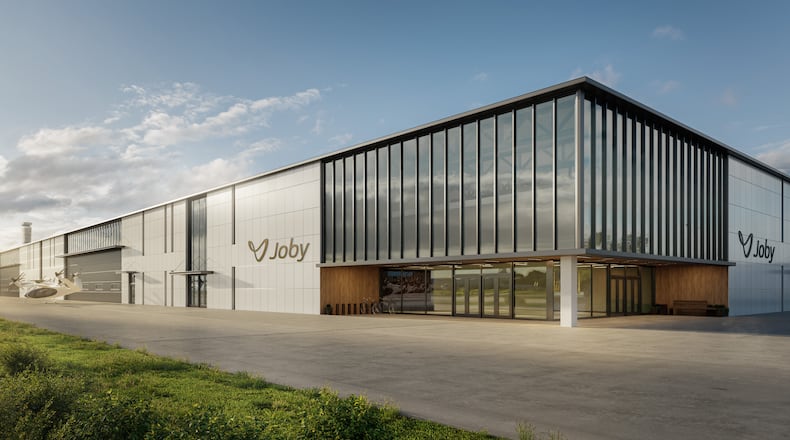Bowles emphasized that Joby’s prototype production line in Marina Calif., near its Santa Cruz headquarters, does not derail its Dayton plans. That Marina production line will be fitted for production of no more than 25 aircraft a year, and it will continue to operate, Bowles said.
But Dayton is where Joby plans to build up to 500 aircraft a year — and if the market one day permits it, perhaps more, Bowles said.
“We need lots of small parts and components,” Bowles said in an interview with the Dayton Daily News Tuesday. “What’s happening at the postal facility in Dayton is we’re standing up a machine shop and machining. That’s going on right now. And so you’ll see, I think by the 9th of September, you’ll see some folks do the retrofit” of the former postal facility.
The goal is to have component production in Dayton by early next year, with scaled assembly of Joby aircraft planned beyond that.
“You’ll also see equipment moving in,” he said.
Bowles spoke Tuesday at the third annual National Advanced Air Mobility Industry Forum at Clark State Community College in Springfield.
In March, Joby took control of a former postal facility near the airport on Concorde Drive, not far from distribution centers for Purina and Energizer.
Grass at the Joby site has been mowed this summer, and someone placed company placards in the building’s front windows. But as of mid-August, there had been no other external signs that the site was being readied for manufacturing.
So far, all of Joby’s manufacturing milestones have centered on work in Marina, Calif. Joby’s facility in Marina is a pilot production line and an “innovation facility” that will support initial commercial operations, the spokeswoman for Joby told this newspaper.
Joby began hiring this year and intends to increase its Ohio employee count as it begin initial operations, the spokeswoman also said. She did not say how many Dayton employees have been hired or for what positions so far.
Bowles said Joby intends to hire an overall Dayton-area general manager, but that has not happened yet.
Last year, the company said it expects to have about 2,000 Dayton employees when peak manufacturing is achieved, but Bowles declined to give a precise timeline for that.
But the demand for these craft — quiet, fast, requiring no runway and little infrastructure — is growing, Bowles maintained.
It’s the craft’s relative silence that has proven to be a particular selling point for Joby. In his public remarks, Bowles said that a New York City group opposed to noisy helicopter flights, called “Stop the Chop,” expressed appreciation for the Joby aircraft’s smaller acoustic signature during a New York demonstration flight in November.
“The demand around the world is tremendous,” he told this newspaper. “The U.S. is an amazing market. New York and L.A. will be great launch markets. As this comes online in the U.S. ... we will use the existing aviation infrastructure — 5,080 U.S. airports, almost 10,000 heliports across the U.S. It’s really ripe for success.”
But only 500 aircraft a year will be “behind the curve” in the first decade of production, Bowles predicted.
More aircraft will be needed, according to the company’s current thinking. But Joby also has to strike a balance, making sure it doesn’t make too many aircraft too soon, and likewise ensuring it doesn’t suffer a lack of aircraft, he said.
Bowles indicated that nothing has happened since the company’s official Sept. 18 announcement in Oakwood last year to alter plans to make Dayton a manufacturing center for Joby.
“The market is huge, the demand is huge,” said Bowles, 48, a Cleveland native. “I’m really excited. I grew up in Ohio. I’m really excited to see all these aircraft all over the world come out of Ohio.”
Joby has announced it is validating its aircraft in Japan, in the United Kingdom, Australia, the United Arab Emirates and elsewhere.
“Twenty to 30 years of demand, it will take a long time, ramping (up production) aggressively to fulfill,” he said.
About the Author




